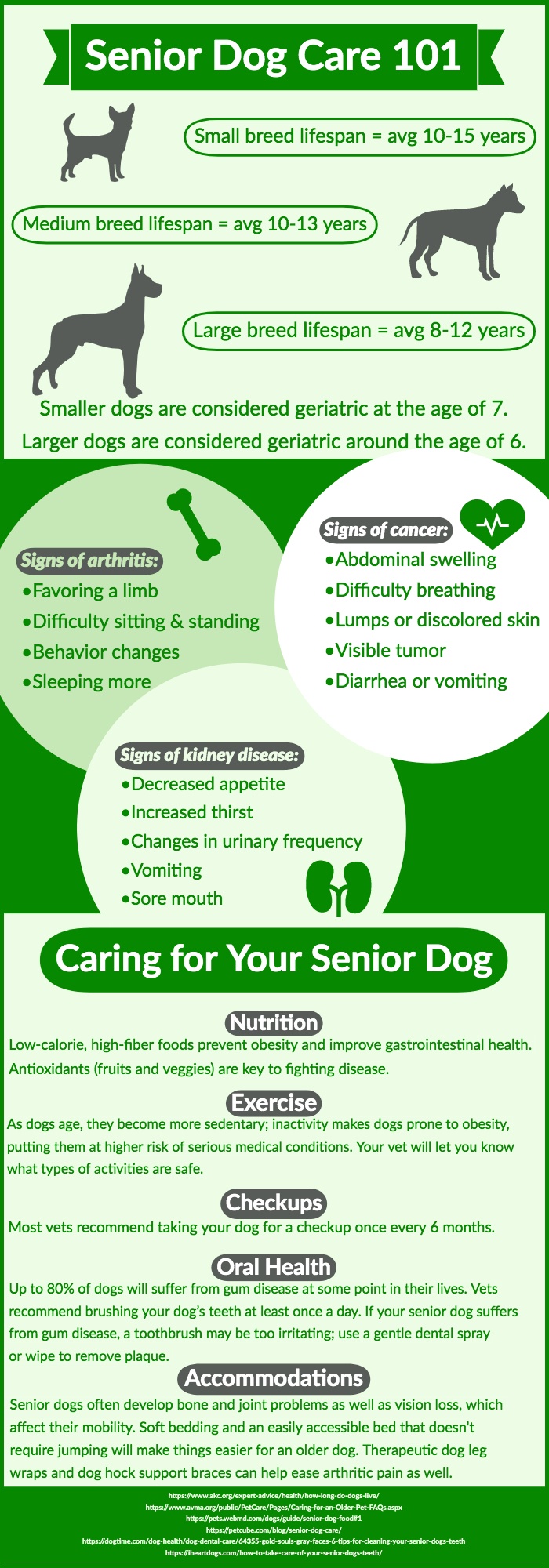Infographic: How To Care For Your Aging Dog
October 22nd, 2019
Guest blog courtesy of Back on Track
Just like us, our furry friends need special care as they get older. Genetics, nutrition, and environment all play a role in how fast your dog ages. But even the most active and healthy of dogs need different care requirements once they become a senior.
When is my dog considered a senior?
Every dog is different, but there are some general guidelines that can determine when your dog has officially become a senior citizen. Giant dogs age faster than tiny dogs. For instance, a Chihuahua isn’t considered a senior until they’ve reached the age of 10 whereas a Great Dane is a senior by age five.
Dog breeds that are between medium and large are considered seniors somewhere in the middle. A golden retriever or black lab might be considered a senior once they’ve reached the age of eight.
What conditions is my dog at risk for?
As your dog ages, they’re more at risk for certain diseases and illnesses. These conditions include:
- Kidney disease: Kidney disease, or kidney failure, is extremely common in aging dogs. Approximately one out of every 10 dogs will experience kidney disease. Symptoms of kidney disease or failure include urinary incontinence, dehydration, reduced appetite, lethargy, vomiting, weight loss, oral ulcers, and pale appearance.
- Arthritis: The two most common types of arthritis in both dogs and people are osteoarthritis and rheumatoid arthritis. Your dog may have arthritis if they have difficulty getting up, they’re not as excited to exercise or play, they show unexpected aggression, they have difficulty climbing stairs, or they show lameness in one or more legs.
- Cancer: There are several types of cancer that can develop in dogs. Some of the key symptoms your dog may have cancer include abdominal swelling, abnormal discharge from different orifices, non-healing sores or wounds, sudden weight loss, lumps or bumps under your dog’s skin, changes in appetite, and changes in bathroom habits.
What can I do to take care of my senior dog?
Your senior dog requires different care as they age. The good news is that there are plenty of ways you can make sure your dog ages comfortably.
Here are a few things you can do to keep your dog happy and healthy as they head into their senior years:
- Visit the vet more often. Regular check-ups are essential to your pet’s health at any age but even more so as your pet ages. Age-related diseases are often subtle and your veterinarian can establish a baseline of what is normal for your pet. Senior pets are advised to visit the doctor once every six months.
- Make sure you’re feeding them the right food. Your dog’s dietary needs change as they get older. Aim for foods that are low-calorie and high-fiber to prevent obesity and to keep gastrointestinal health in good shape.
- Find lower-impact exercises. It might be painful for your dog to run like they used to. Take them for short walks or let them go for a supervised swim. Always have water available for them on hand and pay attention to whether or not your dog is struggling. If they are, it’s time to stop.
It’s important to make changes to your dog’s lifestyle as they age to keep them happy, healthy, and safe. By following the tips above, you can make sure your dog ages gracefully.




